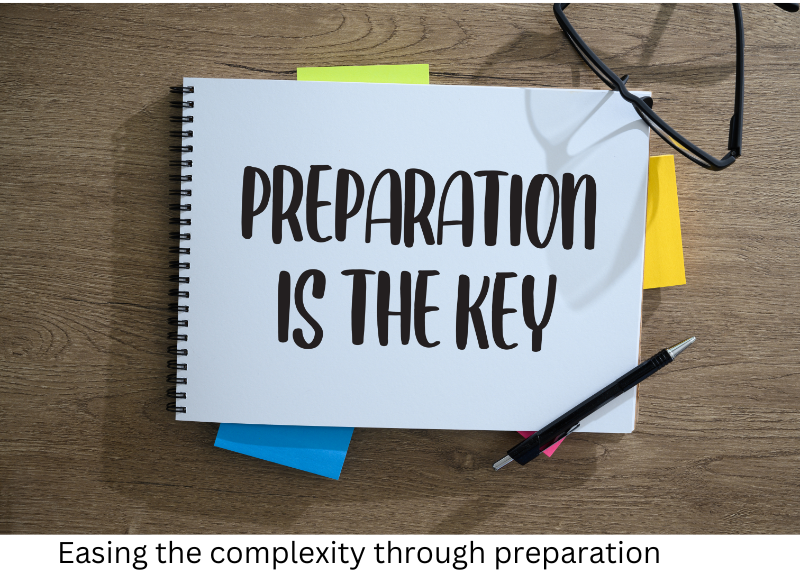Jamie dialed the mediator’s number for the 3rd time. “Third time is the charm—right? Maybe I can finally make the call,” she murmured. When the mediator answered, instead of hanging up, Jaimie’s emotions exploded and she blurted, “How do I prepare for divorce?”
No wonder people struggle to make the call. Divorce disrupts every area of life. The legality adds huge complexity to what seem like easy decisions. The time to complete the process can stretch for years. Depending on the process, other people may decide how much money you have and when you see your children. Can anyone prepare for all this?
You can. Here are some key ways.
Explore options for divorce
Couples first must decide what process to use. Options include:
Represent yourselves—The cost of attorneys often tempts couples to file and settle the issues of divorce on their own. For very simple cases with few assets and no children, this may work well.
But know, if you choose to represent yourselves, you remain fully in control of decisions—without any legal education or protection. Your agreements are held to the same standard as those created by an attorney—leaving you open to unintended consequences.
Any issues you cannot resolve are submitted to a judge at a hearing. During the hearing, you present your positions to the Court and are held to the standard of an attorney. The judge cannot assist should you fail to ask needed questions or fail to meet a burden of proof. Most decisions are final, and others require a high burden of proof to change. So the risks are high.
Attorney representation—If you hire attorneys, ethics rules require that attorneys advise only one party in the adversarial process to ensure the attorney fully protects their client. They consider only the best outcome from their client’s perspective. Thus, attorneys cannot work for both spouses.
Attorneys file the relevant documents, advise clients about their options, and negotiate settlements on behalf of their clients. Decision-making rests largely with the attorneys and judge.
Due to each attorney needing to fully protect both their client and themselves, the discovery process can take months to years. More, attorneys focus primarily on legal issues and guideline resolutions—often missing what is most important to you in the decision-making.
Mediation—Increasingly, couples are turning to mediation. The mediator guides the couple to understand all the issues of divorce, the options for resolving each issue, and the pros and cons of each option. The mediator then guides the couple to choose for themselves the best combination of options for their family’s unique situation. You decide what to do with your money and when you will care for your children.
Mediators educate clients about options, which is usually enough for couples to make well-grounded decisions. At times, however, one or both want advice about what to do. Mediation offers the context for you to seek attorney advice when needed and bring that advice into mediation. Thus, you remain in control of the decisions that affect you while protected if specific advice is needed. Mediated agreements are filed with and are fully enforceable by the Court.
Understand the layers affected by divorce
Even before beginning the process, it can be extremely helpful to understand all the layers divorce impacts. This information normalizes what you may feel or think and helps you prepare for the process from a position of knowledge and proactivity rather than reaction.
Emotional layer—Spouses rarely come to the decision to divorce at the same time. One often struggles for years to address issues hurting the marriage while the other either buries their head or also tries. The first to burn out feels scared of divorce, guilty about hurting their spouse, and concerned for the impact on children—yet also hopeless within their marriage. The other may desperately want to avoid divorce and feel blindsided.
No matter who initiates, the loss of marriage shakes both. Each grapples with grief in all its forms. Preparing for the emotional toll through seeking needed emotional support helps you navigate divorce more successfully.
Family layer—whether there are children, close extended family, or a “family” of friends—divorce changes the dynamics. People feel the loss of some of the most important people in their lives. If you have children, you will need to redefine your family through a parenting plan that preserves parents’ relationships with children from two homes. While you won’t need an official agreement for other relationships, thinking how to redefine those helps diminish the loss of divorce.
Financial layer–Historically, the number one cause of poverty for women has been divorce, and men are increasingly at risk. Today’s couples rarely consider the financial security marriage provides until divorce, when the financial toll hits hard.
Researchers estimate you need a 40% increase in income to maintain the same standard of living post-divorce. Few get raises for divorcing. You must support two houses on the same income previously used for one. This requires a plan to address current bills, to pay off or assign debts, and to arrange assets to ensure financial stability for spouses (and any children). Knowing the changes likely needed and mentally preparing for the financial conversations is key.
Spiritual layer–People of faith often carry an additional burden when divorcing. The shame of intentionally breaking sacred vows or being the unwilling party to divorce affects many. Those going through divorce often feel they failed their spouse, their vows, and God. This hits hard.
If this is you, finding someone who can help you process these issues is key. It may help to understand that God’s plan for marriage is openness and oneness between spouses—emotionally, intellectually, spiritually, physically, and in the everydayness of life. This vulnerability in all areas of life requires deep trust.
People divorce because trust has been broken. So broken they cannot get it back. So, walls go up. Two people living separated, walled lives are in reality already divorced. Going through the legal process simply says, “What we have is not marriage, and we can’t get there again.” It’s telling the truth about your relationship.
Gather information needed to prepare for divorce
Track monthly expenditures–Most Americans hate budgeting. Even worse, automatic payments have generally both increased couples’ overall debt and decreased their understanding of where their money goes (though many couples do use this tool well). Tracking expenses proves critical in divorce.
Spouses must know how much they will need to live to make sound decisions on finances and plan for future security. When couples try to make decisions in a vacuum, conflict escalates. Concrete numbers define possibilities and help couples work together toward viable options.
Establish/protect credit ratings—Everyone entering a divorce should run a credit report. Your score will impact the availability of credit, interest rates, and other options available after divorce. Taking the time before filing for divorce to address any errors and to establish personal credit (if one spouse relied on the other’s) facilitates life after the divorce.
Gather all financial data—Couples should gather at minimum:
- three years of tax forms,
- one year of bank records,
- one year of investment and retirement account summaries,
- values on assets such as houses, cars, significant collections (i.e. coins), etc.
- mortgage owed
- amounts owed on any loan—car loans, student loans, health loans, loans from family, etc.
- six months of credit card receipts
- credit reports
- documents of trusts
Gathering this information will set you up to engage productively in mediation. More, if one spouse has primarily overseen finances, this information will be used to ensure the other spouse fully understands the financial picture before making decisions.
Deciding to divorce often feels like deciding to jump off a cliff. Blindfolded. You don’t know what you don’t know and can feel helpless. Preparing replaces the sense of helplessness with concrete actions you can take. Joining with the right professional to guide you through the process helps ensure you move from what isn’t working to what will. Make the call, we will be happy to answer your questions and help you find a path forward.
If you would like more information on navigating divorce, contact Resolution Mediation by clicking HERE or calling 317-793-0825. We look forward to serving you.
As always, the above is for information only. Seek a professional for guidance in your personal situation.




